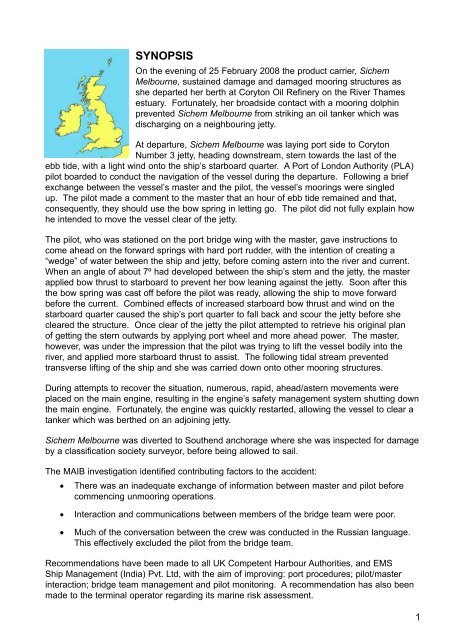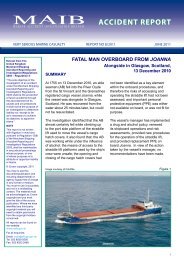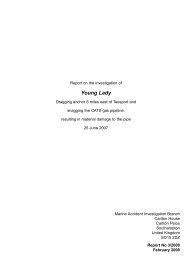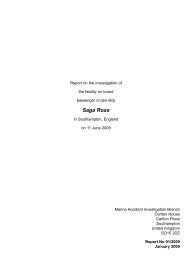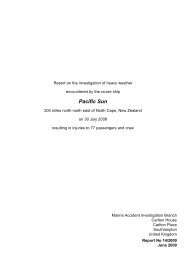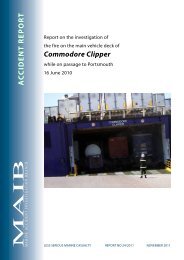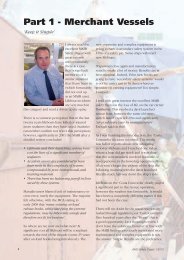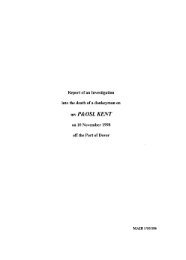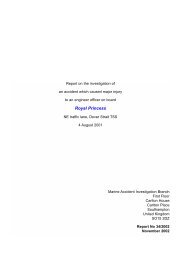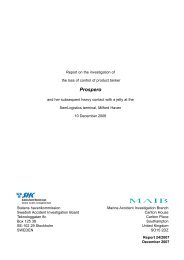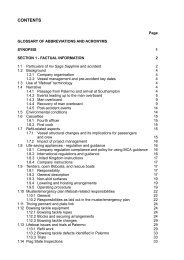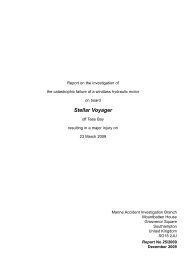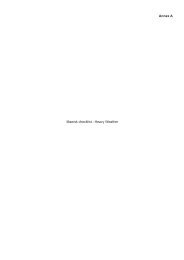Sichem Melbourne - Marine Accident Investigation Branch
Sichem Melbourne - Marine Accident Investigation Branch
Sichem Melbourne - Marine Accident Investigation Branch
Create successful ePaper yourself
Turn your PDF publications into a flip-book with our unique Google optimized e-Paper software.
SYNOPSIS<br />
On the evening of 25 February 2008 the product carrier, <strong>Sichem</strong><br />
<strong>Melbourne</strong>, sustained damage and damaged mooring structures as<br />
she departed her berth at Coryton Oil Refinery on the River Thames<br />
estuary. Fortunately, her broadside contact with a mooring dolphin<br />
prevented <strong>Sichem</strong> <strong>Melbourne</strong> from striking an oil tanker which was<br />
discharging on a neighbouring jetty.<br />
At departure, <strong>Sichem</strong> <strong>Melbourne</strong> was laying port side to Coryton<br />
Number 3 jetty, heading downstream, stern towards the last of the<br />
ebb tide, with a light wind onto the ship’s starboard quarter. A Port of London Authority (PLA)<br />
pilot boarded to conduct the navigation of the vessel during the departure. Following a brief<br />
exchange between the vessel’s master and the pilot, the vessel’s moorings were singled<br />
up. The pilot made a comment to the master that an hour of ebb tide remained and that,<br />
consequently, they should use the bow spring in letting go. The pilot did not fully explain how<br />
he intended to move the vessel clear of the jetty.<br />
The pilot, who was stationed on the port bridge wing with the master, gave instructions to<br />
come ahead on the forward springs with hard port rudder, with the intention of creating a<br />
“wedge” of water between the ship and jetty, before coming astern into the river and current.<br />
When an angle of about 7º had developed between the ship’s stern and the jetty, the master<br />
applied bow thrust to starboard to prevent her bow leaning against the jetty. Soon after this<br />
the bow spring was cast off before the pilot was ready, allowing the ship to move forward<br />
before the current. Combined effects of increased starboard bow thrust and wind on the<br />
starboard quarter caused the ship’s port quarter to fall back and scour the jetty before she<br />
cleared the structure. Once clear of the jetty the pilot attempted to retrieve his original plan<br />
of getting the stern outwards by applying port wheel and more ahead power. The master,<br />
however, was under the impression that the pilot was trying to lift the vessel bodily into the<br />
river, and applied more starboard thrust to assist. The following tidal stream prevented<br />
transverse lifting of the ship and she was carried down onto other mooring structures.<br />
During attempts to recover the situation, numerous, rapid, ahead/astern movements were<br />
placed on the main engine, resulting in the engine’s safety management system shutting down<br />
the main engine. Fortunately, the engine was quickly restarted, allowing the vessel to clear a<br />
tanker which was berthed on an adjoining jetty.<br />
<strong>Sichem</strong> <strong>Melbourne</strong> was diverted to Southend anchorage where she was inspected for damage<br />
by a classification society surveyor, before being allowed to sail.<br />
The MAIB investigation identified contributing factors to the accident:<br />
• There was an inadequate exchange of information between master and pilot before<br />
commencing unmooring operations.<br />
•<br />
•<br />
Interaction and communications between members of the bridge team were poor.<br />
Much of the conversation between the crew was conducted in the Russian language.<br />
This effectively excluded the pilot from the bridge team.<br />
Recommendations have been made to all UK Competent Harbour Authorities, and EMS<br />
Ship Management (India) Pvt. Ltd, with the aim of improving: port procedures; pilot/master<br />
interaction; bridge team management and pilot monitoring. A recommendation has also been<br />
made to the terminal operator regarding its marine risk assessment.<br />
1


